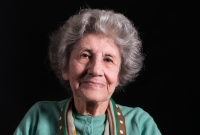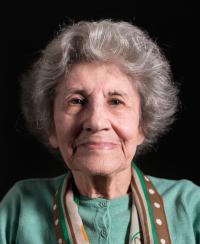I will stay but you shall escape and save yourself

Download image
Gila Fatran, née Ella Goldstein, was born on 8 December 1929 in Michalovice in eastern Slovakia into a religious Jewish family as the sixth and youngest child. Her father Jehuda ran a shop with paints but later focused on social work, gathering material and financial aid for poor Jewish families. Her mother Sára was a housewife and helped out in the shop. In 1939 Ella was forced to leave the state school and resume her studies at a newly-founded Jewish school. The family shop was Aryanized but as an economically-important Jew, Ella’s father and his children were temporarily protected against deportations. The anti-Jewish pogroms intensified throughout 1942. Fearing further raids, by the end of 1943 her parents had sent the 14-year-old Ella along with her pregnant sister-in-law and her two-year-old son to Hungary. Following the invasion of Hungary by the Nazis, both secretly returned to Slovakia, reuniting with part of the family in Žilina in May 1944. In the following months they went into hiding in Žilina and later in Nové Mesto nad Váhom. Ella’s parents were uncovered there and deported to the Seredi camp. Ella escaped and hid with strangers up until January 1945 when she found her brother and his wife with whom she hid in Žilina until the end of the war. Her parents, several siblings and many other relatives were murdered. After the liberation she graduated from a school of commerce and joined the Zionist HaShomer HaTzair movement. For two years she had worked as an educator in the HaShomer HaTzair house in Bratislava and was preparing to leave the country for Palestine. She moved to Israel legally in the fall of 1949 along with her future husband, a Slovak Jew. In Israel she changed her name to Gila and adopted her husband’s surname Fatran. She studied pedagogy and history, obtaining a doctorate degree at the Hebrew University in Jerusalem. She researches the history of Slovak Jews during the Holocaust, publishing several studies and a monograph. Gila is a member of the Yad Vashem memorial commission which awards the Righteous Among the Nations honor. Since the 1990s she has been visiting Slovakia but permanently lives in Israel.

